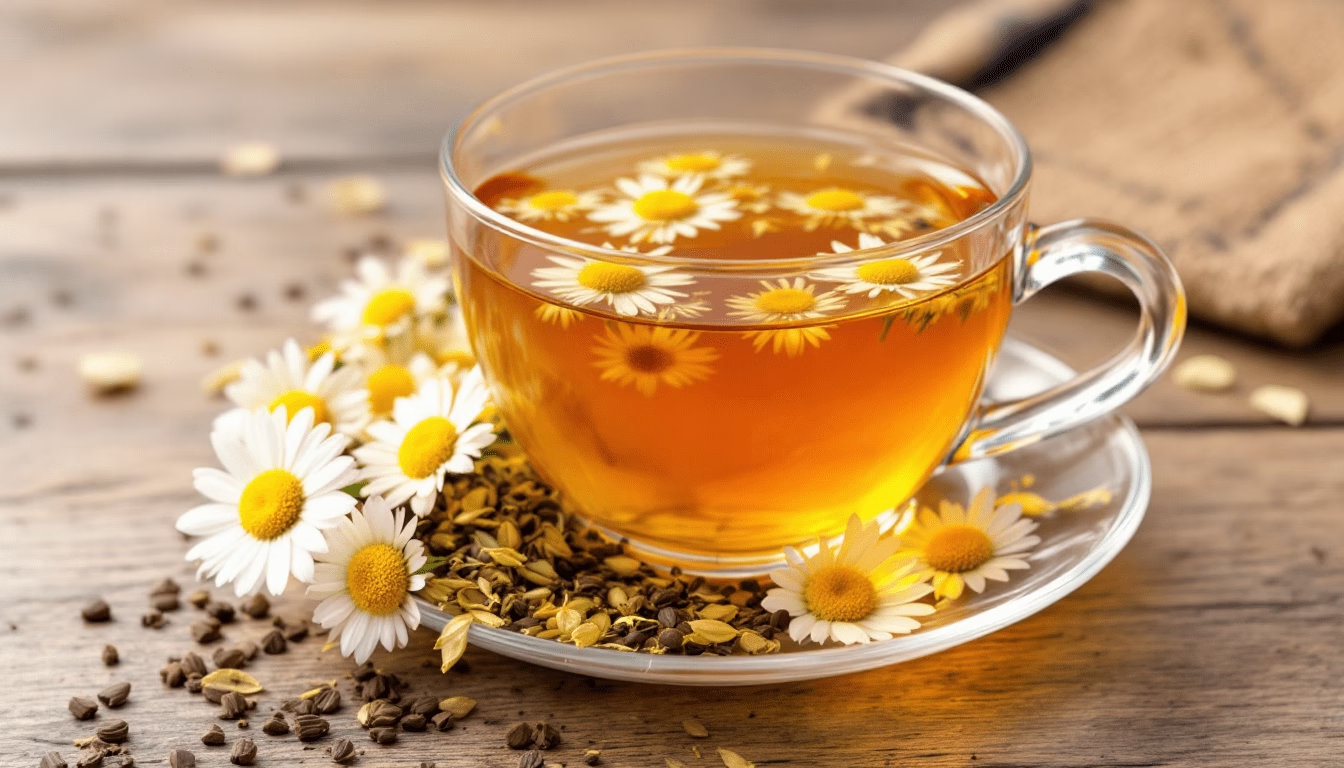Chamomile tea has gained recognition worldwide for its soothing properties and numerous health benefits. This herbal infusion is primarily derived from the dried flowers of the chamomile plant, which belongs to the Asteraceae family. There are two main types of chamomile used for tea: Roman chamomile (Chamaemelum nobile) and German chamomile (Matricaria chamomilla). Both varieties are celebrated for their distinct flavors, aroma, and therapeutic qualities, although German chamomile is more commonly used in various herbal remedies.
The origins of chamomile tea can be traced back to ancient Egypt, where it was revered for its healing properties and used in traditional medicine. Over the centuries, this herbal remedy has evolved, with various cultures incorporating it into their health practices. For instance, it has been utilized in European folk medicine, offering relief from conditions ranging from anxiety to digestive disorders. The use of this tea in these contexts showcases its potential as a natural treatment tool, reinforcing the necessity of scientific investigation to substantiate such claims.
Unlock Your Potential with YOLO DNA Health!
Preparing chamomile tea is a straightforward process that can be accomplished with dried flowers or pre-packaged tea bags. To prepare it using dried flowers, one simply needs to steep the flowers in hot water for several minutes, allowing the beneficial compounds to infuse into the liquid. The result is a fragrant, golden-hued beverage that not only warms the body but also provides a sense of calm. While it is often enjoyed for its delightful taste, many consumers seek it out for its purported health benefits, which are increasingly supported by scientific research.
1. Rich in Antioxidants
Chamomile tea is renowned not only for its soothing properties but also for its impressive antioxidant content. Antioxidants play a crucial role in protecting the body from oxidative stress, which can lead to cellular damage and contribute to the onset of various chronic diseases. The primary antioxidative components in this tea are flavonoids and phenolic compounds, both of which are abundant in this herbal infusion. Recent studies highlight that these compounds can help neutralize free radicals, thereby reducing inflammation and promoting overall health.
Among the flavonoids found in chamomile tea, apigenin is particularly noteworthy, as it has been linked to numerous health benefits, including anti-inflammatory and anti-cancer properties. The phenolic compounds, on the other hand, provide an array of health benefits, reinforcing the immune system and supporting cardiovascular health. By incorporating this herbal infusion into one’s diet, individuals can naturally enhance their intake of these vital antioxidants.
Research indicates that regular consumption of chamomile tea can significantly contribute to overall wellness. For instance, a study published in a leading journal found that participants who consumed this tea regularly exhibited lower levels of oxidative stress markers compared to those who did not. This finding suggests it can effectively combat oxidative damage, which is a key factor in the development of age-related diseases such as diabetes, heart disease, and certain types of cancer.
Overall, the rich antioxidant profile of chamomile tea highlights its beneficial role in promoting health and wellness. By reducing oxidative stress, this herbal beverage not only enhances the body’s natural defenses but also aids in the prevention of chronic health conditions, making it a valuable addition to a balanced diet.
2. Promotes Better Sleep
Chamomile tea has long been recognized for its soothing properties, particularly in the context of enhancing sleep quality and combating insomnia. Its efficacy in promoting better sleep is supported by a number of scientific studies that highlight its sedative effects. One of the key compounds found in this tea is apigenin, a flavonoid that binds to specific receptors in the brain. This interaction produces calming effects, which can contribute significantly to improved sleep onset and overall quality of rest.
Research published in the “Journal of Advanced Nursing” indicates that individuals who consume chamomile tea consistently report fewer episodes of insomnia and a marked improvement in their sleep patterns. The study emphasizes that the herbal tea before bedtime can lead to a more peaceful night’s sleep. The calming properties attributed to it are thought to come from its ability to decrease anxiety levels, a common precursor to sleep disturbances.
Furthermore, another notable study published in “Phytotherapy Research” demonstrated that participants who were given chamomile extract exhibited significant improvements in sleep quality compared to those who received a placebo. These findings suggest that the bioactive compounds in chamomile tea not only facilitate the onset of sleep but also enhance its quality, offering a natural alternative for those struggling with sleep-related issues.
The preparation of chamomile tea is simple: steep dried flowers in hot water for several minutes, allowing the beneficial compounds to infuse into the liquid. Drinking a warm cup of chamomile tea before bedtime may not only foster relaxation but also enhance the likelihood of a restful night’s sleep, making it a valuable addition to nightly routines for individuals seeking a natural remedy for insomnia.
3. Supports Digestive Health
Chamomile tea has long been recognized for its potential benefits in promoting digestive health. Its soothing properties can help to alleviate various gastrointestinal discomforts such as indigestion, bloating, and gas. Research suggests that the compounds found in chamomile, particularly chamazulene and bisabolol, possess anti-inflammatory and antispasmodic effects, which can aid in relaxing the muscles of the intestines. This relaxation may contribute to the reduction of cramping and discomfort often associated with digestive issues.
Multiple studies have explored the efficacy of chamomile tea in providing relief from symptoms of dyspepsia, a condition characterized by persistent or recurrent pain in the upper abdomen. In one notable trial, participants reported significant improvements in their symptoms after regular consumption of this tea. This suggests that integrating chamomile tea into one’s daily routine may be an effective natural remedy for digestive ailments.
Additionally, the anti-inflammatory properties of chamomile can help to soothe the mucosal lining of the intestines, potentially alleviating conditions like gastritis and ensuring a smoother digestive process. Historically, it has been used in various cultures as a herbal remedy, indicating a long-standing belief in its digestive benefits.
It is also worth noting that chamomile tea may have a mild sedative effect, which can assist in reducing stress and anxiety factors that can contribute to gastrointestinal discomfort. By promoting relaxation, it may further enhance digestion and overall gastrointestinal function.
Incorporating chamomile tea into one’s diet could be a simple yet effective approach to support digestive health. The combination of historical usage and modern scientific research underscores the potential of this herbal infusion as a natural remedy for those seeking relief from digestive disturbances.
4. Anti-Inflammatory Properties
Chamomile tea has long been celebrated for its wide array of health benefits, among which its anti-inflammatory properties stand out. The chamomile plant, particularly its flowers, contains several bioactive compounds, such as flavonoids and terpenoids, which have been shown to exert notable anti-inflammatory effects. These compounds work by inhibiting the production of pro-inflammatory cytokines and enzymes, thereby modulating the body’s inflammatory response.
Research has demonstrated that chamomile tea can be beneficial in managing chronic inflammation, which is linked to various health conditions, including heart disease, diabetes, and certain autoimmune disorders. A study published in the journal “Molecules” found that the extract significantly reduced inflammation in human cells and animal models. The anti-inflammatory effects are particularly attributed to the active ingredient, alpha-bisabolol, which has been shown to suppress inflammatory markers.
Moreover, the regular consumption of chamomile tea may provide relief for individuals who suffer from inflammatory conditions such as arthritis. A clinical trial revealed that participants who consumed it regularly reported reduced pain and swelling in affected joints when compared to those who did not include this herbal infusion in their diet.
In addition, chamomile tea may also benefit gut health by soothing gastrointestinal inflammation, making it a suitable option for those suffering from inflammatory bowel diseases (IBD). The soothing properties of this herbal infusion can help reduce discomfort and promote healing in the gut lining.
By incorporating chamomile tea into one’s daily routine, individuals can potentially harness its anti-inflammatory properties, contributing to overall health and well-being. However, it is always advisable to consult with healthcare providers when considering alternative treatments for chronic inflammation.
5. May Enhance Immune Function
Chamomile tea is often celebrated not only for its soothing properties but also for its potential benefits to the immune system. Research suggests that regular consumption of this herbal infusion may aid in enhancing immune function, which is particularly valuable during times when the body is vulnerable to infections such as colds or flu.
One study highlighted the role of chamomile tea in promoting antiviral activity. The active compounds present in it, such as apigenin and chamazulene, have been shown to exhibit properties that may help inhibit viral replication. This means that drinking this tea might not only act as a comforting remedy during colder months but could also provide a defense mechanism against viral threats, potentially reducing the severity of symptoms associated with common colds.
In addition to its antiviral effects, chamomile tea has also been linked to antioxidant activity. Antioxidants play a crucial role in protecting the body from oxidative stress, which can compromise immune function. By consuming chamomile tea regularly, individuals may support their overall health, thereby contributing to a more resilient immune system.
Furthermore, the anti-inflammatory properties inherent in chamomile tea could further bolster immune responses. Inflammation is a natural part of the body’s defense system, yet chronic inflammation can lead to various health issues, including impaired immune function. By reducing inflammation, this tea may help maintain a balanced and effective immune response.
While more extensive research is needed to fully understand the extent of chamomile tea’s impact on immune function, the existing data indicate that this herbal concoction could be a valuable addition to a healthy lifestyle. Consuming chamomile tea regularly may not only provide immediate comfort but also foster long-term health benefits that enhance the body’s ability to fend off infections.
6. Helps Manage Stress and Anxiety
Chamomile tea has long been celebrated for its calming effects, making it a popular natural remedy for stress and anxiety. Recent scientific studies have begun to uncover the specific mechanisms behind these benefits, particularly in relation to the tea’s impact on cortisol levels, a hormone that plays a crucial role in the body’s stress response. High cortisol levels can lead to various health issues, including increased anxiety, sleep disturbances, and other mental health challenges. Drinking chamomile tea may assist in moderating cortisol production, promoting a sense of calm and balance.
Additionally, chamomile tea is rich in antioxidants, which can help reduce oxidative stress in the body. This reduction in oxidative stress has been linked to improved overall mental well-being. Specific antioxidants found in it, such as apigenin, have been shown to bind to receptors in the brain that exert a mild sedative effect, helping to alleviate feelings of anxiety and promote relaxation. This connection underscores why chamomile tea is often recommended for individuals experiencing heightened levels of stress or anxiety.
Incorporating chamomile tea into one’s routine can also facilitate better sleep, which contributes to improved mental health. Sleep and mental well-being are closely interlinked; insufficient sleep can exacerbate feelings of anxiety and stress. The sedative properties of chamomile tea may support a more restful night’s sleep, thus promoting a more balanced and less anxious disposition during the day. Overall, the comforting ritual of preparing and sipping it not only serves as a moment of self-care but may also provide meaningful relief from the pressures of daily life.
7. Supports Skin Health
Chamomile tea is renowned for its myriad health benefits, including its positive effects on skin health. The compounds present in chamomile, particularly chamazulene and bisabolol, exhibit anti-inflammatory and antioxidant properties that can significantly soothe skin irritations. When applied topically, infused chamomile extracts have been shown to alleviate conditions such as eczema and dermatitis, providing relief from symptoms such as redness, itching, and swelling.
Research suggests that chamomile tea can be an effective remedy for minor skin irritations. A study published in the journal “Phytotherapy Research” highlighted that topical application of chamomile extract led to substantial improvements in skin hydration and reduced roughness in subjects with dry skin. The anti-inflammatory nature of chamomile may help calm the skin, making it a natural choice for individuals with sensitive or reactive skin types.
In addition to its topical applications, the internal consumption of chamomile tea also contributes to skin health. Drinking this herbal infusion can help internally reduce inflammation throughout the body, which may subsequently reflect on the skin’s appearance. This anti-inflammatory effect can be beneficial in managing chronic skin conditions, making it easier to maintain a healthier complexion over time. The antioxidants in chamomile, such as flavonoids, also work to combat free radicals, potentially slowing down skin aging and improving overall skin texture.
Moreover, the soothing aroma of chamomile tea can offer psychological benefits, promoting relaxation and reducing stress. Stress is often linked to various skin disorders, including acne flare-ups and eczema exacerbations. By enjoying a warm cup of this tea, individuals may find relief from stressors that could be affecting their skin health.
Unlock Your Potential with YOLO DNA Health!
The Versatile Benefits of Chamomile Tea
Throughout this article, we have explored the remarkable health benefits of chamomile tea, revealing its multifaceted role in promoting overall wellness. This herbal infusion, recognized for its calming properties, not only aids in relieving stress and anxiety but also plays a significant part in improving sleep quality. Its reputation as a natural remedy extends to various other areas, such as digestive health, anti-inflammatory effects, and potential immune system support. Studies have shown that chamomile tea may assist in alleviating conditions like indigestion and menstrual pain, providing a gentle, soothing option for those seeking relief.
Furthermore, chamomile is rich in antioxidants, which contribute to its effectiveness in combating oxidative stress and inflammation within the body. This property positions chamomile tea as a potential ally in maintaining heart health and supporting proper metabolic function. The evidence presented underscores the importance of the compounds found in chamomile and their implications for long-term health benefits. With its wide range of applications, this tea emerges as a valuable addition to one’s daily regimen.
In light of these findings, it may be worthwhile for individuals to consider incorporating chamomile tea into their daily routines, whether enjoyed during quiet moments of reflection or as a soothing end to a hectic day. However, while the existing studies are encouraging, further research is necessary to fully understand the extent of chamomile’s benefits and potential therapeutic uses. With its versatile nature and accessibility, chamomile tea stands as a worthy topic for continued exploration in the realm of natural health solutions.
Frequently Asked Questions:
What are the benefits of chamomile tea?
Chamomile tea offers several benefits, including:
Promotes relaxation and reduces anxiety.
Aids in digestion and relieves stomach discomfort.
Supports better sleep quality and treats insomnia.
Contains antioxidants that may boost immune health.
May reduce inflammation and alleviate pain.
Helps soothe skin irritations when applied topically.
It can be beneficial for menstrual pain.
Can you drink chamomile tea every day?
Yes, you can drink chamomile tea every day.
Is it good to drink tea every day?
Drinking tea every day can be beneficial due to its antioxidants and potential health benefits, but moderation is key.
Body, Mind, And Soul For A Fulfilled Life!



